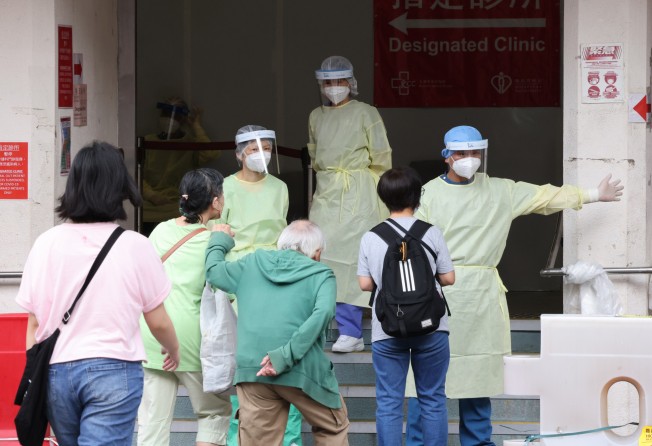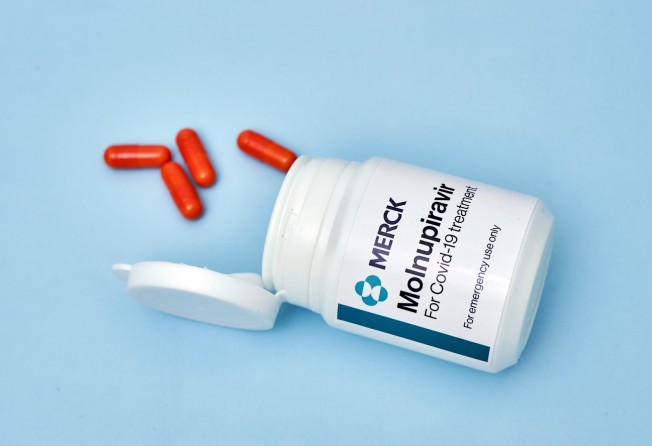
Hong Kong study shows early use of antiviral drugs cuts risk of death in Covid-19 patients
- Large-scale study shows positive effects of two drugs given early to patients still in the community
- Pfizer drug also reduces risk of patients becoming severely ill, having to be admitted to hospital

The early use of antiviral drugs reduces the risk of death significantly in patients infected by the Omicron variant of the coronavirus causing Covid-19, a large-scale study in Hong Kong has found.
The study, which involved more than 10,000 people who were infected but not in hospital, was funded by the Health Bureau and carried out by the University of Hong Kong (HKU).
Slightly under half were given the drug molnupiravir, produced by Merck and sold as Lagevrio, while the rest received nirmatrelvir/ritonavir, made by Pfizer and sold as Paxlovid.
Their response to the orally administered drugs was compared with a much larger group of Covid-19 patients who did not receive the antivirals.
The researchers found that Nirmatrelvir/ritonavir reduced the mortality rate among patients by two-thirds compared with the control group, and also lowered their risk of becoming severely ill and ending up in hospital by almost a quarter.
Molnupiravir reduced the mortality rate by a quarter compared with the control group, but had no significant impact on reducing the risk of patients being hospitalised.
For those who had to be admitted in hospital, being on either antiviral slowed down the progression of the disease by more than two-fifths.

HKU assistant professor Carlos Wong King-ho, who conducted the study, said the research did not aim to determine whether one drug was better than the other, but to assess their effectiveness compared to patients who did not receive antivirals.
Still, nirmatrelvir/ritonavir’s additional benefit of reducing the risk of hospitalisation was noted especially among older patients and those not fully vaccinated.
Unlike earlier studies that looked at the effect of oral antivirals on patients in hospital, the study assessed how they worked on Covid-19 patients in the community.
Patients picked for the study were at the early stages of infection, having symptoms within the previous five days, and those at risk of becoming more severely ill, such as people aged 60 and above or those who were not fully vaccinated.
Wong said the result of this study and earlier research showed the need to give priority to prescribing the oral antiviral drugs to the most vulnerable groups who would benefit the greatest, the elderly and those who were not vaccinated.
He had earlier studied the effect of the drugs on patients hospitalised within three days of being confirmed to have Covid-19 but who did not need oxygen on admission.
Between February and April, 1,856 patients were given molnupiravir and 890 were given nirmatrelvir/ritonavir within their first two days in hospital, and they were compared against an equal number who did not get the antivirals.
Both drugs reduced the patients’ mortality rate by more than half, with molnupiravir reducing it by just over half, and nirmatrelvir/ritonavir by two-thirds.
The drugs also helped prevent the patients’ condition from worsening and reduced their risk of needing oxygen.
In that study too, those who benefited most were the elderly and patients who were not fully vaccinated.
While the research findings aligned with other similar previous studies on the effectiveness of the two oral antiviral drugs, it also suggested their prescription could reduce the death rate of non-hospitalised patients.
A Chinese University study released earlier this month which analysed 21,138 hospitalised and 33,217 non-hospitalised patients, suggested that prescribing both drugs could reduce the death rate of hospitalised patients by 76 per cent.
It also found that taking the drugs brought down the chances of non-hospitalised patients being admitted by 88 per cent.

Asked about the HKU study, the Hospital Authority (HA) said it was using both molnupiravir and Paxlovid to treat Covid-19 patients in need, including those at public hospitals, designated clinics, care homes for the elderly, holding centres and community isolation facilities.
“The experts of the HA have all along been keeping abreast of the epidemic situation, the latest development of clinical treatment and scientific evidence, and updated data from global drug regulatory authorities as well as pharmaceutical companies,” the authority said.
“The HA is closely communicating with the drug manufacturers concerned with a view to procure and stockpile suitable Covid-19 drugs in a timely manner.”
The authority added that it would continue to ensure Covid-19 patients had access to drugs that were both safe and effective for treatment.